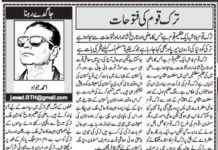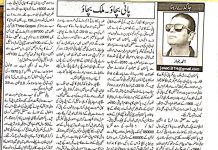By Ahmad Jawad
Just 5 months ago, whole nation was hysterical in the love of Edhi. Campaigns were run to name Airports after his name. Within 5 months, Edhi Foundation is falling down due to financial crisis. Donors disappeared with the demise of Edhi. Governments are never interested in non political heroes who create embarrassing analogies between politicians and such heroes: be it Edhi or Raheel Sharif. I repeatedly remind that we have sparks of excellence in our country but without institutional backing no spark will turn into a permanent flame of excellence. Every spark comes down only to fade away in our country. Perhaps we don’t deserve Sparks of heroism, we deserve what we chose.
Source : By Zaigham khan in The News, ” Save the Edhi Foundation “
Less than five months after Pakistan gave a gun carriage funeral to Abdul Sattar Edhi, his life’s work – the Edhi Foundation – is facing serious financial difficulties. This is not because of any fault of those who are trying to fill his colossal shoes, but because we, the people of Pakistan, who built this great institution alongside Edhi, are losing interest in it.
“Donations to the Edhi Foundation have declined after Edhi sahib’s death and we are facing a difficult time both emotionally and financially”, Faisal Edhi, son of the late Edhi, and head of the foundation told media persons recently.
Much has been written recently about Edhi’s glorious life and his tireless services to humanity. The state funeral for Pakistan’s most celebrated faqir was also debated in the media. More than a state funeral, it was a ceremony of incorporation – the state of Pakistan staking a claim on the dead body and memory of Abdul Sattar Edhi. Given a chance, he would have silently walked out and taken a solitary ambulance to his last abode. Though it created much resentment amongst those who were denied a chance to bid farewell to the man they held dear, it was an appropriate send-off to a man who ran a state within the state and ruled a parallel welfare kingdom. It was after a long time that the state did something appropriate at the symbolic level.
Glory is one thing Edhi never sought in his life and he did not need it in his death. However, we badly needed to bestow honours upon him because he appeared to embody our own conscience. At a time when nothing seemed to be in its place, he served as a moral compass to the whole nation.
Edhi had great personal qualities and a dedication to his mission that made him a larger-than-life figure and bestowed a saintly status upon him. However, he would have been just another mad man if he had not had support from the people of Pakistan, particularly the people of Karachi, who provided him with resources to turn his dreams into reality. His welfare empire required a lot of money to build and a lot of money to run. This money did not come from any foreign donors or from the state; all of it was donated by common people.
Those who supported Edhi never asked any questions or demanded any audit reports. They trusted him though he ran the foundation in a primitive way, with an antiquated system of administration and financial management. This at times resulted in serious problems including leakages, thefts and frauds, but people’s trust in him remained unshakable, because they knew they could trust their own conscience.
During his lifetime, the Edhi Foundation stood on the pillars of his personal charisma. After his death, the organisation is going through problems that Weber might have called the routinisation of charisma. The charisma that Edhi carried can either be routinised in the person of his son or it can be routinised in the Edhi Foundation. Faisal, it appears prefers the second option.
Faisal Edhi is well suited to succeed his father. He is not only dedicated to his father’s mission but also has the knowledge and skills to turn the Edhi Foundation into a modern charity that follows modern management systems. He must move fast to adopt the modern tools and techniques.
Modern charities spent a good part of their resources on fund-raising and management and these expenses should never be considered a waste of resources. For example, Oxfam spends eight percent of its budget on fund-raising while it spends 25 percent of its funds on wages and running costs. Shaukat Khanum, despite Imran Khan’s charisma, spends sizable resources on campaigns to raise funds. Edhi in comparison spends nothing. While that worked during Edhi lifetime, it may not work any longer.
The Edhi Foundation must avoid overreach. For example, international relief activities do not fit in with Edhi’s mandate and its expertise. There are dozens of well-resourced international relief organisations with expertise in disaster relief and reconstruction. Similarly, as the government has introduced its own ambulance services to cover highways, Edhi can focus more on smaller cities and rural areas.
According to one estimate, Pakistanis donate one percent of GDP to philanthropy, which is roughly 100 percent more than what Indians contribute. According to the Pakistan Centre for Philanthropy (PCP), Pakistanis donated Rs140 billion in 2010. However, a good part of this money is either donated directly to the poor or is received by religious institutions or charities.
This situation, however, is changing. The Citizens Foundation provides quality education to underprivileged children at its excellent campuses with support from local philanthropists; Sindh Institute of Urology and Transplantation (SIUT), set up by Dr Adeeb Rizvi, has treated more than one million patients suffering from kidney problems with our donations; Imran Khan also set up the Shaukat Khanum Cancer Hospital with support from Pakistanis.
Edhi is a unique organisation that provides a broad array of services and fills up a huge vacuum left by the state. Having started with a used Hillman Pickup truck refurbished into an ambulance, Edhi’s ‘Poor Patient Ambulance’ is the largest voluntary ambulance organisation in the world with 1800 ambulances providing free services to millions of poor patients every year. In India, a video of a man carrying the dead body of his wife on his shoulders went viral recently. Edhi’s ambulance service is one reason that we do not see such scenes in our country.
The Edhi Foundation is centred on the value of human life and human dignity. Edhi was much criticised by our mullahs for putting baby cradles outside its centres to received unwanted babies. This alone has saved lives of hundreds of innocent unwanted babies, many of whom might have been killed or left to die. Edhi homes provide refuge to orphans, abandoned and lost children, mentally challenged persons and senior citizens.
What I find most remarkable is the Edhi Foundation’s emphasis on ensuring dignity in death for all humans. Before Edhi became a large organisation, dead bodies of victims of crimes, accidents and homeless persons often remained unattended by roadside for hours or even days as police stations quarrelled about their respective jurisdictions. At Edhi, workers are trained to carry out proper rituals even for decaying dead bodies.
I have already stolen this space to promote a cause. However, I want the Jang Group to do a lot more for the Edhi Foundation. Geo teamed up with the Imran Khan Foundation during the 2010 floods; these efforts resulted in generous donations. It is time for Pakistan’s largest media organisation to support the Edhi Foundation in a similar manner to ensure its sustainability.
The Edhi Foundation belongs to us all. We must understand that the real angels of our times are not individuals but institutions. And, my dear readers, it is also time for you to reach for your credit cards and donate to the Edhi Foundation through its website (www.edhi.org). Long live Edhi. Long live the Edhi Foundation.







